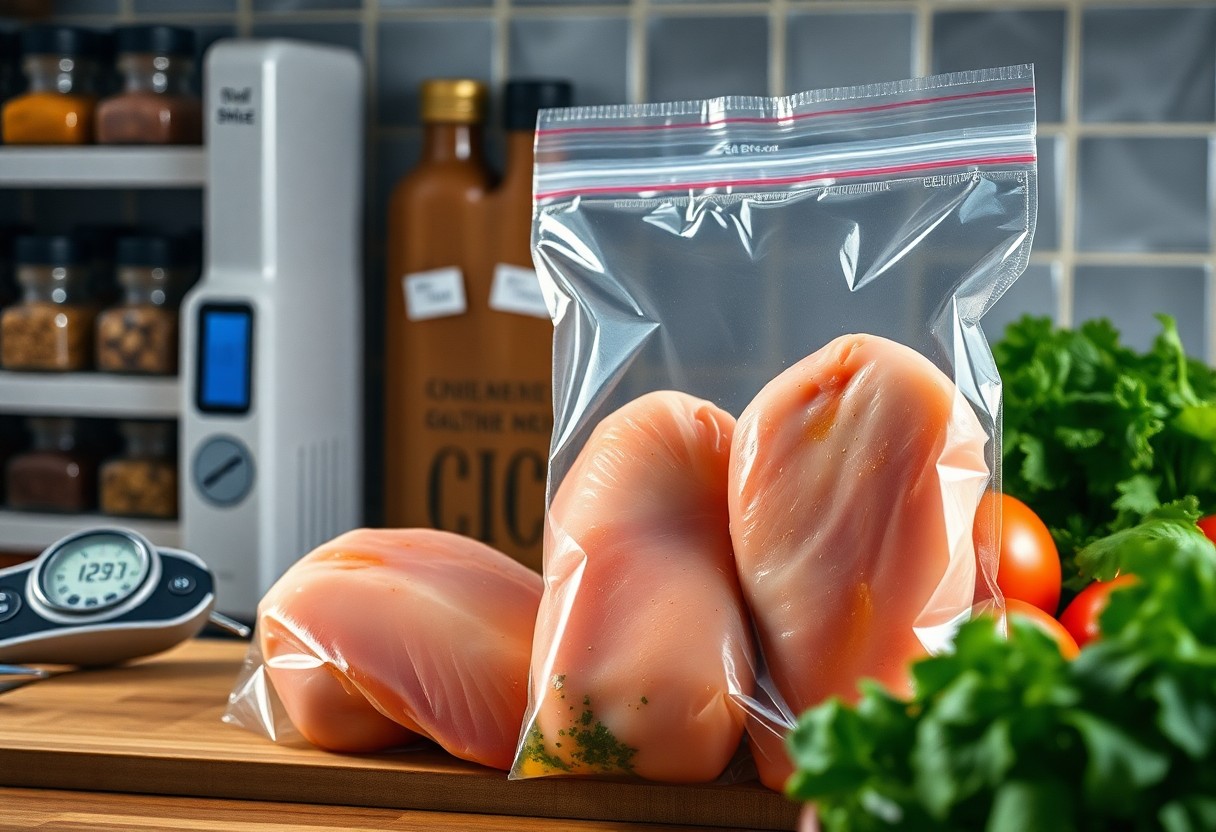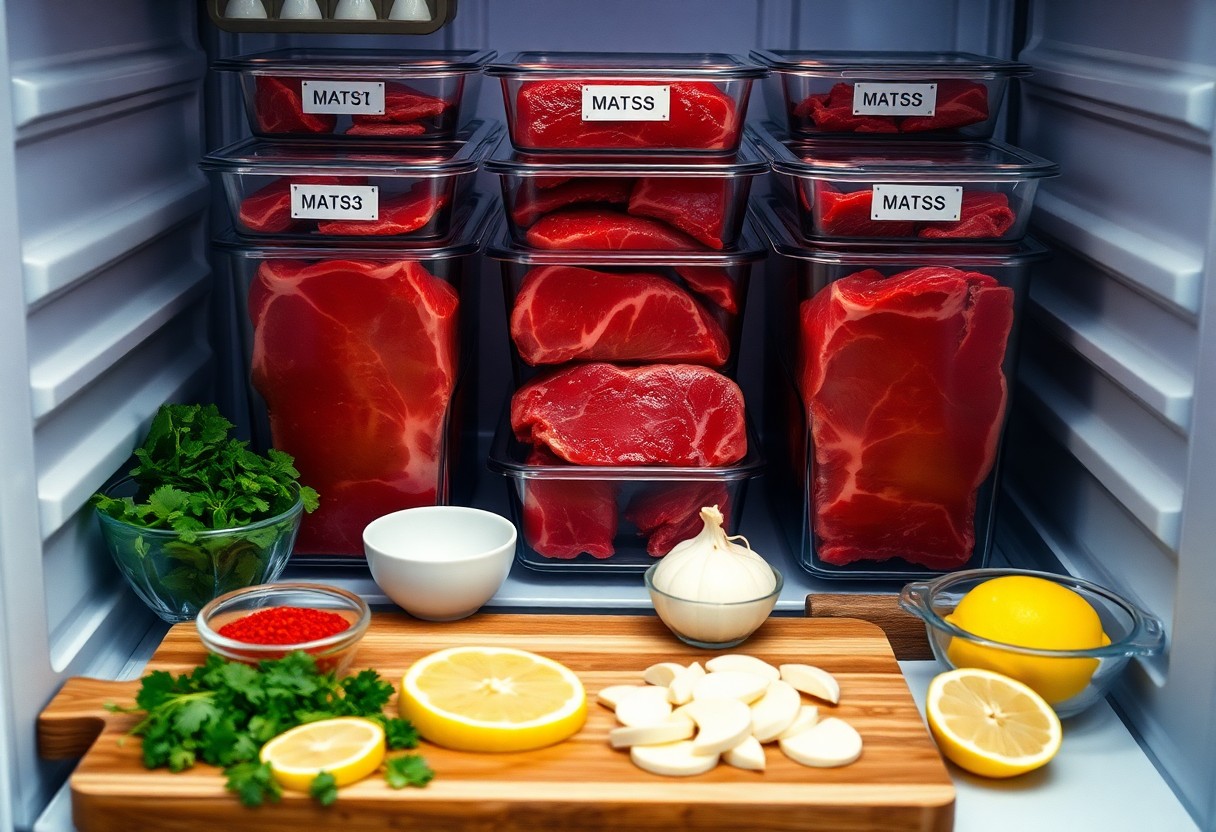Most people underestimate the importance of marinating meat safely, which can lead to foodborne illnesses. By following this comprehensive guide, you’ll learn how to enhance flavors while ensuring your meals are delicious and safe to eat. Proper marinating practices not only improve the taste but also reduce the risk of contamination. Get ready to transform your cooking with simple, effective steps that prioritize your health and elevate your culinary skills.
Key Takeaways:
- Always use a non-reactive container, such as glass or plastic, to marinate meats to prevent any chemical reactions that can affect taste and safety.
- Marinate meats in the refrigerator, never at room temperature, to inhibit bacterial growth and ensure food safety.
- Use the appropriate marinating time, which varies by meat type; over-marinating can negatively affect texture and flavor.
Types of Marinades
Understanding the different types of marinades can significantly enhance your meat preparation. They generally fall into three categories: acid-based, oil-based, and dry rubs. Each type serves a unique purpose in flavor enhancement and tenderization. Here’s a brief overview:
- Acid-based: Often contains vinegar or citrus juices.
- Oil-based: Typically includes olive oil or other fats.
- Dry rubs: Composed of herbs and spices without liquid.
Any marinade can elevate your dish, as detailed in Meat Marinating 101 with Recipes.
| Type | Description |
| Acid-based | Utilizes acids to tenderize and flavor meat. |
| Oil-based | Enhances moisture, flavoring through fats. |
| Dry rubs | Provides robust flavors without liquid. |
Acid-Based Marinades
Acid-based marinades rely on acidic ingredients like vinegar, lemon juice, or yogurt to break down protein fibers in meat. This process not only tenderizes but also infuses flavors, making your dishes more flavorful. It’s important to avoid over-marinating, as excessive acid can create a mushy texture.
Oil-Based Marinades
Oil-based marinades primarily use oils like olive oil or sesame oil as a base, often combined with herbs and spices. The oil helps transfer fat-soluble flavors while keeping the meat moist during cooking. This type of marinade can deeply penetrate the meat and create a delicious crust when grilled.
Oil-based marinades prove effective for adding richness and moisture to your meat dishes. The oil serves as a flavor carrier, ensuring that the spices and herbs coat your meat thoroughly. You can experiment with various oil types, from olive to coconut, each imparting a unique taste profile. A balanced oil-based marinade will also contain an acid component for optimal tenderness and flavor infusion.
Factors Affecting Marination
The effectiveness of your marination process is influenced by various factors that can impact flavor and tenderness. Key factors include:
- Meat type
- Thickness of meat
- Marinade composition
- Time
- Temperature
Knowing these elements allows you to tailor your marination approach for optimal results.
Meat Type
The type of meat you choose plays a significant role in how well it absorbs flavors from the marinade. Poultry typically requires less marination time compared to beef or pork, which benefit from longer soaking due to their denser textures. Each type brings unique qualities that interact differently with the marinade ingredients, affecting overall flavor.
Thickness of Meat
The thickness of your meat directly impacts the marination process; thinner cuts absorb marinades more quickly than thicker ones. Generally, thinner pieces may only need 30 minutes to an hour, while larger cuts like roasts should marinate for several hours or overnight. This variance ensures proper penetration of the marinade, enhancing flavor without compromising texture.
For thicker cuts of meat, like a 2-inch steak or a whole chicken breast, a longer marination time is necessary to achieve the desired flavor enhancement. The marinade needs enough time to work through the meat, tenderizing it and infusing it with the intended flavors. Considering this, marinating options such as injecting liquid brines can also be utilized for quicker flavor infusion in thicker cuts.

Step-by-Step Marinating Process
| Step | Description |
| 1. Prepare Ingredients | Gather fresh herbs, acids (like vinegar or citrus), and oils. |
| 2. Mix Marinade | Combine ingredients in a bowl for an even flavor blend. |
| 3. Add Meat | Ensure meat is fully coated; use a resealable bag or container. |
| 4. Refrigerate | Marinate in the fridge, not at room temperature, for safety. |
| 5. Discard Marinade | Always discard leftover marinade to avoid cross-contamination. |
Preparing the Marinade
Creating your marinade starts with choosing a balance of acid, fat, and seasonings. Acidity helps tenderize the meat, while oil adds moisture and flavor. Experiment with combinations like soy sauce, olive oil, and garlic for steak or lemon juice, yogurt, and cumin for chicken. For detailed information, refer to Poultry: Basting, Brining, and Marinating.
Marinating Techniques
There are multiple techniques you can use while marinating. For even flavor infusion, consider using a shallow dish or resealable plastic bags, allowing maximum surface contact. You can also try using a vacuum sealer to enhance the marinading process, as this creates a perfect environment for flavors to penetrate the meat efficiently.
If you’re pressed for time, quick marinades can be effective for thinner cuts, typically soaking for 30 minutes to 2 hours. On the other hand, tougher cuts benefit from longer marinades of 12 hours or overnight. Adjust your marinating duration based on the type of meat and desired flavor intensity, keeping safety and effectiveness in mind throughout the process.

Tips for Safe Marinating
Ensuring your marinating process is safe involves several key practices. Always use a clean, non-reactive container for marinating, such as glass or food-grade plastic, to prevent contamination. Marinate your meat in the refrigerator instead of at room temperature, as this inhibits bacterial growth. When reusing marinade, bring it to a boil to kill any harmful bacteria. For even marination, turn the meat occasionally. Thou must also discard leftover marinade that has come into contact with raw meat.
Storage Guidelines
Store your marinating meat in the refrigerator at all times, ideally in a designated container sealed with a lid. Ensure it’s placed on the bottom shelf to prevent drips on other foods. Use the meat within 24 hours for best results, and keep the marinade away from cooked items to avoid cross-contamination.
Timing Considerations
The amount of time you marinate your meat significantly impacts flavor and tenderness. For lean cuts like chicken breasts or fish, 30 minutes to 2 hours is sufficient, as they can become mushy if left too long. In contrast, tougher cuts such as beef brisket or pork shoulder benefit from marinating 6 to 24 hours to allow flavors to fully penetrate. Timing is vital; over-marinating can alter the texture negatively, leading to overly soft or unappetizing meat.
Overall, consider the characteristics of your meat when determining marination duration. For instance, acidic marinades can work faster, whereas oil-based mixtures may require more time for effective penetration. You can experiment with different timings to find the perfect balance that suits your preferences; monitor how the meat reacts, and adjust accordingly. Proper timing ensures optimal flavor and texture for a truly enjoyable dish.
Pros and Cons of Marinating
| Pros | Cons |
|---|---|
| Enhances flavor significantly. | Can be time-consuming. |
| Tenderizes meat for better texture. | Risk of foodborne illness if not done safely. |
| Adds variety to dishes. | Flavor can overpower delicate meats. |
| Utilizes readily available ingredients. | May alter cooking times. |
| Can make meals more nutritious. | Requires planning ahead. |
Benefits of Marination
You can unlock a range of flavors and textures through marination. The process not only enhances the taste of your meat but also tenderizes it, making it more enjoyable to eat. Acids in marinades, such as vinegar or lemon juice, break down proteins, resulting in a juicier final dish. Additionally, using marinades rich in spices and herbs can add nutritional value and promote a healthier meal option.
Potential Drawbacks
While marinating has its advantages, it comes with potential drawbacks. The time commitment required can deter those seeking quick meal solutions. Additionally, improper handling or marination times can lead to food safety issues, potentially resulting in foodborne illnesses.
It’s also important to note that marinating too long can lead to textural changes, making some meats mushy and unappealing. If you’re not cautious, the strong flavors may overwhelm more subtle dishes, hindering the intended taste experience. Investing in proper marination methods requires diligence in preparation and safety, making it crucial to balance convenience with quality.
Conclusion
With this in mind, following the steps outlined in your marinating meat process is crucial for achieving flavorful results while ensuring food safety. You should always use the right container, adhere to recommended marinating times, and refrigerate your meat to prevent bacterial growth. By applying these practices, you can enhance the taste of your dishes while protecting your health. Enjoy the art of marinating with confidence, knowing that you’re doing it safely and effectively.
FAQ
Q: What are the basic steps to marinate meat safely?
A: Start by selecting your meat and placing it in a non-reactive container. Prepare your marinade, ensuring it includes acid (like vinegar or citrus juice), oil, and seasonings. Pour the marinade over the meat, ensuring it is fully coated. Cover the container and refrigerate for the recommended time based on meat type. Discard any leftover marinade after use.
Q: How long should meat be marinated for optimal flavor?
A: The marinating time varies by meat type. For chicken, 2-24 hours is optimal; for beef, 4-24 hours; for fish, 30 minutes to 2 hours. Over-marinating can adversely affect texture and flavor.
Q: Can I use the marinade for cooking after marination?
A: No, using marinade from raw meat for cooking poses food safety risks. However, you can boil the marinade for several minutes to kill any bacteria, then use it as a sauce if desired.
Q: What are safe containers for marinating meat?
A: Use non-reactive containers such as glass, stainless steel, or food-grade plastic. Avoid aluminum containers, as they can react with acidic marinades, affecting flavor and safety.
Q: Is it safe to marinate meat at room temperature?
A: No, always marinate meat in the refrigerator. Room temperature can promote bacterial growth, increasing the risk of foodborne illness.
